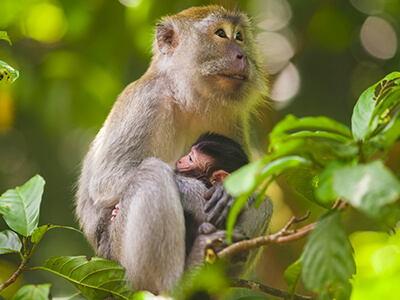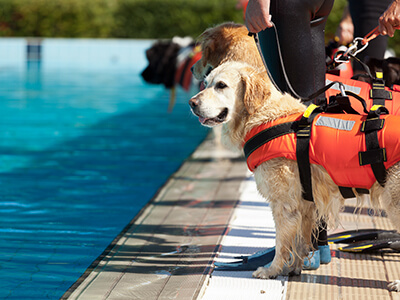High Educational Value
Nationally recognized educational quality at an affordable price.
*Source: ONet Online/U.S. Bureau of Labor Statistics. Unity cannot guarantee employment. Salary data represents averaged earnings for occupations listed and includes workers at all levels of education and experience.

This course provides an in-depth look at the design, implementation, and optimization of breeding animals, with a particular focus on conservation of genetic diversity. Students explore the principles of genetic and breeding productivity, inheritance patterns and genetic drift, as well as the basics of quantitative and molecular genetics.

Students will be introduced to concepts around how animals learn and how to best care for animals based on individual and species-specific needs. Information can be applied to best practices around the husbandry, training and handling of animals with the goal of minimizing animal stress and improving human-animal interactions.

Throughout the term, students investigate how environmental challenges to homeostasis dictate the physiological strategies and responses of animals, including consequences to their health and well-being. Students will also focus on the evaluation of data collection methodologies for use in research and veterinary care.

Animal Health and Behavior is a critical field focused on the physical well-being and behavioral patterns of animals. Combining veterinary care, animal psychology, and behavior analysis, this field aims to ensure animals are healthy and exhibit natural behaviors, improving their quality of life. Professionals in Animal Health and Behavior study disease prevention, treatment, and the environmental impacts on animal behavior. They also explore the complex interactions between animals, humans, and other animals.
This field is essential in various settings such as zoos, farms, animal shelters, and laboratories. Experts work to enhance animal care and welfare through innovative practices and research. Key areas include understanding animal nutrition, preventive healthcare, behavioral training, and enrichment programs. By focusing on both physical health and behavior, professionals help animals live healthier, more fulfilling lives.
The BS in Animal Health and Behavior degree prepares students for careers at zoos and aquariums, in the veterinary fields, as animal welfare officers, and for a future focused on the care and well-being of wild and captive animals around the world. This degree provides students with the essential knowledge and professional skills to succeed in settings such as veterinary medicine degree programs, companion and wild animal care facilities, wildlife rehabilitation, and preserves.
Your online education should be affordable and manageable. Thanks to our promise to keep tuition flat through 2030, you won’t be burdened with unexpected increases or fees.
Our team of distance education concierges will work with you through the admissions process to help you plan and pay for your degree. Learn more about the costs here.
Our comprehensive 120-credit program can be tailored to fit your schedule and goals! Completion time is flexible, determined by the number of credits you choose to take each term (8 terms/year) and less time with transfer credits. Without transfer credits, you can anticipate the following completion times:
General Education Core: 35 credits
Environmental Professional Core: 13 credits
Elective Courses: 42 credits
Program Core: 30 credits
For course requirements and a better look into your program, view our full course catalog. Then apply online for free to get started.
The animal health and behavior degree requires 120 credits. You may transfer in up to 90 credits from outside institutions. View our full course catalog for a better look into your program. Then apply online for free to get started.
Nationally recognized educational quality at an affordable price.
Committed to sustainable practices to prepare for a future of environmental awareness.
Dedicated to turning career and academic aspirations into tangible achievements.
Accepting up to 90 transfer credits to graduate sooner and save money.
Connect with experts who share your passion for working in the animal industry.
Ranked in the top 1% of universities nationwide by the Social Mobility Index.
With up to 8 terms a year, you can take a break without jeopardizing financial aid.
Balance life, work, and education by studying when and where you want